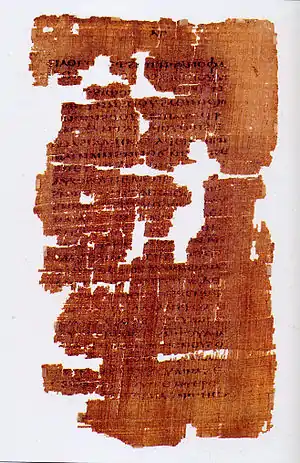Epistle of the Corinthians to Paul
The Epistle of the Corinthians to Paul is a work from the New Testament apocrypha, and originally formed part of the Acts of Paul, although it was later detached and circulated separately. It was a response to a letter that Paul wrote to the Christian settlement he had founded in Greece.[1][2]
| Part of a series of articles on |
| Paul in the Bible |
|---|
.jpg.webp) |
|
See also |
Content
Paul wrote his first letter to the Corinthians in 50 AD. The text of this letter was later lost and is unknown to present-day scholars. The Corinthians responded in a series of questions. This writing claims to describe the teachings of Simon Magus, including the ideas that God was not almighty, that the resurrection was false, that Christ was not truly bodily incarnated God (i.e. Docetism), that angels made the world (see Demiurge), and that the prophets were inaccurate. A response to this letter from Paul also appears in the Acts of Paul and is known as the Third Epistle to the Corinthians.
Authorship
The Epistle of the Corinthians to Paul is believed to have been written by an orthodox writer, claiming Apostolic authority against their docetic and gnostic enemies. Despite having been widely recognised as not having been written by Paul in ancient times, for a period this epistle and its response appeared in the Armenian Bible.
References
- "Letters of Paul to the Corinthians | Summary, Historical Context, & Facts". Encyclopedia Britannica.
- Olshausen, Hermann (November 26, 1851). "Biblical Commentary on St. Paul's First and Second Epistles to the Corinthians". T. & T. Clark – via Google Books.
